Another Timbre TimHarrisonbre
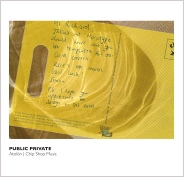
at59 Public Private
Atolón + Chip Shop Music
Ruth Barberán, Alfredo Costa Monteiro, Ferran Fages
+ Erik Carlsson, Martin Küchen, David Lacey, Paul Vogel
Recorded in Barcelona, February 2012
Interview with Ferran Fages
Where did the idea for combining Atolón and Chip Shop Music come from?
In Atolón we're always thinking and talking about the possibility of playing with other improvising groups who have a particular kind of sound and musical approach. In 2010 Chip Shop Music played in Barcelona and after that concert we had an intuition that playing together could be a real opportunity. The idea we had was that both groups should confront each other musically while trying not to be affected by each other's musical styles. It was a clear idea but it needed some time to make it happen.
Could you explain how exactly the two groups combined their sounds when they did finally play together in February 2012?
The idea was to think of the collaboration as a duo rather than merging everyone into one large ensemble. The musicians from the two groups were physically separated on different sides of the performance space; we didn't mix ourselves into one formation. In the event it wasn't easy to play without being affected by the other group's music, but that was the challenge.
Chip Shop Music combines electronic and acoustic sounds and has a wider range of dynamics than Atolón. They have two percussionists and use several electronic devices. Atolón has a smaller range of dynamics and – in this group at least - all three of us play acoustically, and so use more similar kinds of sounds.
One way we tried working together was by dividing the music into blocks of time. Before each rehearsal, we decided which group should start playing when. So, for example, for the opening 4-5 minutes of Public it’s only Chip Shop Music playing.
What does the title ‘Public Private’ refer to?
The CD came out of a period of three days in which the two groups worked together, culminating in a concert. From the several hours of recordings, we felt that we had two strong tracks: the concert and one other session. So ‘Public’ is the concert recording, and ‘Private’ was our favourite of the studio / rehearsal tracks, which were played without an audience. Also in the case of ‘Private’, having agreed a duration, we recorded Atolón and Chip Shop Music separately, so that neither group knew what the other did. Then afterwards I simply mixed the two recordings together. It was an interesting way in which the two groups could combine while also retaining their identities.
In addition to your work with Atolón, you also play frequently with Cremaster (with Alfredo Costa Monteiro), as well as solo and in various other formations. In fact you’ve become a prolific figure within improvised music circles. Could you say a little about how you came to the music?
I came to the music out of a mixture of chance and curiosity. Since I was a teenager I knew that music is the most enriching and comprehensive experience. So when I turned 21 I decided to study music. My family didn’t like it. But despite taking lessons and studying music for two years, I consider myself a self-taught musician. A crucial moment for me was attending an AMM concert in Barcelona in 1995. But until 1998 I couldn't find musicians here to share my musical interests. Fortunately I then met Joan Saura, Ruth Barberán and Alfredo Costa Monteiro, among others.
How has the ‘scene’ in Barcelona changed over the years in which you’ve been active?
The musical scene centred on improvisation hasn’t changed much since my early years. The ‘scene’ in Barcelona is a very small group of people: audience and musicians. It was small when I started and it's small today. This musical scene in which I am moving is marginal.
Perhaps in the high moments of the Spanish financial bubble (2000-2006) there was an excess of money and there was a possibility of supporting culture a little, even minority art forms. But today the Barcelona ‘scene’ is basically fed and sustained by the efforts of a few individuals and groups who take on the task on an almost entirely altruistic basis.
Yes, that’s very much my impression. Does it frustrate you that the scene in Barcelona is still so marginal, even after you and others have spent years living, working and playing there? I should add that these days even a much larger ‘scene’, such as that in London, also has to find ways to survive without arts funding, so perhaps it’s not too different really. But don’t you sometimes dream of moving to London or Berlin, where there’d be far more like-minded musicians?
One of the most frustrating things is that people here are lazy about moving around within the city. Barcelona is a relatively small city, but if you schedule a concert away from the centre, the audience will be very small. Occasionally there are moments of self-criticism to try to make things change, but it's not easy. People from the south have no consciousness of working together as compared to northern societies. It's our social and political drama.
But in spite of this, I'm not dreaming of moving to London or Berlin. Right now, I'm attached to Barcelona. And I earn my living from other activities which it wouldn't be possible to do outside Barcelona.
Going back to your early days as a musician, what instruments did you study?
My main instrument is guitar. When I decided to study at a music school I had to study jazz guitar, which I wasn't interested in at all. So two years later I quit. After that I decided to take some private lessons to learn some guitar techniques and improve my skills, but I still consider myself self-taught as a guitarist.
Nowadays you seem to play a different instrument in every group you play in: electronics with Cremaster, turntables with Atolón, guitar with Ap’strophe and so on. Is it a conscious decision to keep a particular sound for each group?
Yes, it's a conscious decision, but it came about gradually. I consider myself more a researcher than a musician. In my day to day existence I spend a lot of time observing, listening and researching, exploring the timbral qualities of traditional instruments, objects or machines. So a natural consequence of this way of thinking about my sound production is to choose a different instrument or device and find a particular sound for each group. I try to think of my musical projects as small units of my research and musical practice.
I know that in addition to improvising, you’ve also started composing music. Could you tell us a little about that?
I've always composed music, even though I'm better known as an improviser. My compositions are an extension of my research into the nature of acoustic phenomena such as vibration, transmission, reflection, resonance and stationary frequencies, feedback and beating tones. The results of my experiments take shape in my compositions, and these acoustic phenomena have provided a storyline for my work.
Since 2003 some of my compositions have appeared on my solo guitar albums, such as "a cavall entre dos cavalls", "cançons per a un lent retard", "al voltant d'un paral·lel" or "llavi vell"...
Since 2010 I've started to compose pieces which involve other instruments and musicians. As a composer I want to write open form pieces, where musicians have to listen actively and take decisions. From the compositional point of view, my goal in the pieces I write is to break down conceptual barriers between instrumental and amplified procedures, as well as between improvisation and composition.
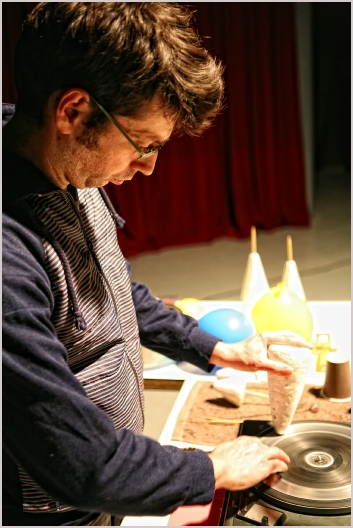
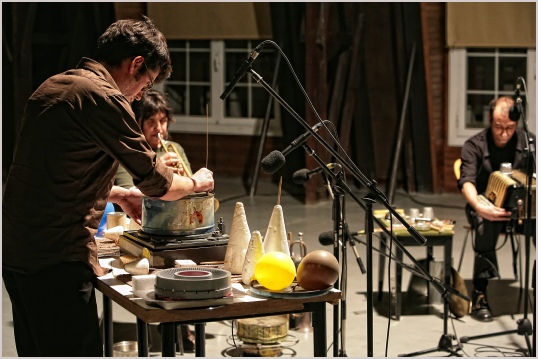
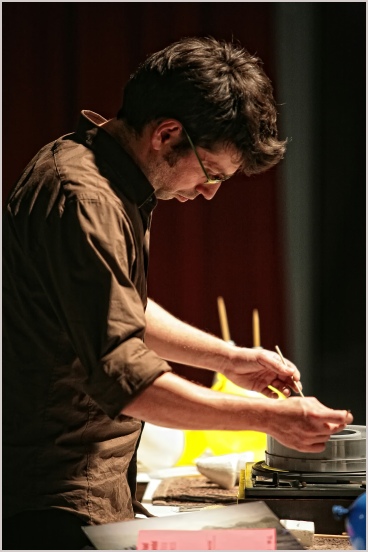
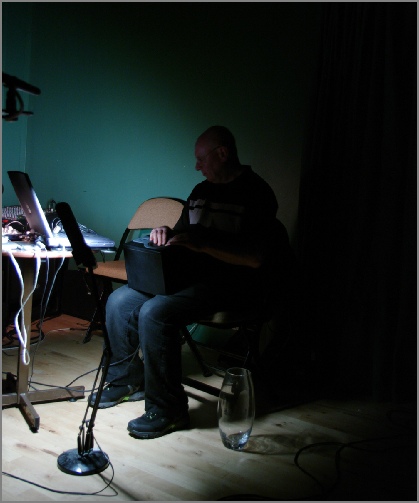
Interview with Paul Vogel
How and when did you come to improvised music?
I came to improvised music in the 1970’s through rock music, particularly the music of the Canterbury scene and Henry Cow. I was always interested in “unusual” music, which meant I missed a lot of good mainstream music which was too “ordinary” for the younger me.
Fred Frith’s articles in the NME on guitar solos were influential in getting me to research the solos he mentioned. Also Steve Lake (and others) writing in the Melody Maker and NME mentioned Derek Bailey and Evan Parker, and so reading between the lines I began to check stuff out. I wrote away for LP’s to various places such as The Public House Bookshop in Brighton and slowly began to hear people associated with Incus and FMP. The first actual LP I heard was one I bought in Dublin, S.M.E.’S So what do you think? and I didn’t know what to make of it. It has remained a tough listen to this day. The reason I was able to buy it in the Dublin of the 1970’s was because it was on the folk label Tangent. I also listened to a lot of free jazz. Coltrane’s Meditations was a favourite. Stockhausen’s improvised pieces too, Prozession being my favourite.
I was taking drum lessons around this time, which I found a bit tame, and I bought myself a clarinet with the intention of eventually playing alto sax. Through mentions in Musics magazine (a great source of unusual musics and debate) I realised that there was a musicians’ co-operative movement in England and so I made contact with the Bristol co-op and went to their festivals, meeting and playing with some terrific players who are now largely forgotten. Brett Hornby, Mark Langford, Bob Helson and the Menter brothers were very influential for me. On clarinet, Simon Mayo was terrific. I was also playing in Dublin with an Irish guitarist called Kevin Kenny who idolized John McLaughlin and he ended up sounding like a combination of Derek Bailey and McLaughlin, but Kevin’s heart was in tonality and so he went on to become a horticultural instructor! We tried to organize some workshops in Dublin but there was no interest at that time. So we mostly played in the countryside and once I did a solo set for a group of “traveller” children on the site of a derelict building in Dublin city centre. I think they liked it.
Moving on to more recent times, how and when did Chip Shop Music come about?
Chip Shop Music was formed in Dublin in 2007 after Erik Carlsson and Martin Kűchen played an ‘i and e’ concert on the same bill as David Lacey and I. We got together in my house the next day and the result was the first Chip Shop Music cdr. There was an immediate understanding both musically and personally between the four of us, and so we continued to look for more playing opportunities both in concert and in grants for recording. For me Chip Shop Music is the ideal vehicle for expression. I feel comfortable in doing whatever I want. I never think about whether what I do will be frowned upon as “not appropriate”. (I remember one gig where I was dancing on stage). Too often in some groups there is a feeling that some areas are off limits and there is usually some self-appointed guardian who oversees the supposedly “free process”. This kind of thing is the musical equivalent of psychoanalysis’s “harsh superego” and is destructive of openness. For me Chip Shop Music is entirely free of the harsh judgment of controlling personalities and the result is joyfulness.
The name of the group is the subject of some speculation between the four of us. My memory of it is that Martin Kűchen said that another musician (who shall be nameless) described Martin’s free jazz style as “chip/chop” (slap tongue) and so the name came from that.
So with that unusual degree of closeness within the group, how did you feel it worked out when you came to combine with Atolón and played together in Barcelona?
Well, as Ferran explained, we adopted different strategies to cope with the joint venture. Strategies that worked well enough, so making the music was easy, though in a way I was troubled by that ease. Nowadays there seems to be an almost default way for musicians in this kind of music to interact: keep quiet, make minimal gestures, leave lots of space and you can be pretty sure it’ll sound ok. But to my mind this is as restrictive as an assumption that you should play loud, make large extrovert gestures and leave no space. It does mean that musicians from different parts of the world (though only certain parts) can come together and make something that sounds good enough, and generally in my experience audiences are satisfied with a solid professional performance. But is it really good enough? I don’t think so.
So was the collaboration between the two groups quite difficult from your point of view?
As I said, the actual music-making side was easy, but there were a lot of disagreements after the recording session as regards choice of tracks, cover design etc. Doubtless this was partly because virtually all communication was done by email in English, which is the first language of only two of the joint group of seven. This made things difficult for the rest of the group, especially when Google Translate was being used to decipher complex negotiations!
But more generally I found it interesting to see what happens when a non-hierarchical group (social, political or artistic) tries to make decisions in a democratic way. I think it would have been enlightening to publish all the email correspondence as a sociological record of the pitfalls inherent in this kind of international collaboration. To be axiomatic, any product or service that you buy has encoded within it a series of complex relations that should in my view be examined, and personally I believe that the same ethical standards should be applied to both the private and public spheres. I don’t know how much of the conflict in this case was generated by the personalities involved, and how much by taken for granted attitudes towards decision-making by individuals who have different world views and who come together to make music, but who have never really explored with each other the different social and political backgrounds that their attitudes have been formed in. Musically we have taken for granted rules which limit what we do and which most of us accept but which the best of us don’t. As regards non-musical communication with this group, I think the title of Junior Kimrough’s record sums things up aptly, “most things haven’t worked out”. And I don’t say that facetiously.
That’s interesting; in my experience decision-making in non-hierarchical groups of more than five is almost always difficult, so I’m not surprised that there were problems. But can we go back to Dublin? How is the experimental music scene there, and how has it changed?
The scene here, as across Europe, has been decimated by funding cuts. Some plucky souls have always survived without funding, and they continue to thrive. Perhaps that’s the best way to operate. Anyway we have no choice now. When I started playing in the late 70’s there was no scene at all. So at least now there is a variety of musics being played. Old style “busy” improv, I think, came in large part from free jazz and there never was a free jazz scene in Ireland. So we went from mainstream jazz (after decades) almost to post-jazz of the downtown N.Y. variety with nothing in between (not that I’m trying to draw a straight developmental line between the two). I think the mainstream jazzers, who were very competent at what they did, frowned upon the supposed incompetence of many sixties free improvisers and that influenced musical taste for listeners as well as musicians. There was some experimental composed music, but its practitioners were conservatory based and, I think, steeped in the world where legitimation was provided by academic qualification.
The development of music in Ireland, as well as anywhere, reflects the changing social and political circumstances in society. The end of the domination of the Catholic Church and the main political party - Fianna Fail - has meant there have been unprecedented changes in Ireland in the last decade. Before that the war in Northern Ireland had a huge impact on how people in the south regarded themselves and how they wanted to be seen internationally (‘the violent Irish’). Personally I think it all went downwards after the Irish aristocracy abandoned the people in 1607 (the flight of the earls) and left all authority to the Catholic Church and the educated Irish, who became arbiters of taste in culture. The wannabe Irish middle-class stopped speaking Irish because it was a language associated with poverty, oral traditions and everything they wanted to get away from. The same with Irish traditional music. With the development of nationalism in the nineteenth century the situation was reversed, but the new nationalist image was of an Ireland before the British invasion and was backward-looking and conservative. There has been a gradual opening up in Irish society from the 1960’s onwards, but musically this has been slow. Increased access to international publications about experimental music has helped, and of course the internet has made research very easy. There is now an audience for free jazz that never existed before, but I feel the model for improvisers in this country is more that of, shall we say, loud and extrovert rather than quiet and sensitive. I was involved in the group ‘i and e’, who offered an alternative to that view, but our audiences were always small (as I guess they are in most countries) and got smaller and smaller towards the end.
I don’t know how things will develop now, but one thing is for sure: there are a lot more people willing to try to make things happen in a variety of musics with or without funding than there were ever before.
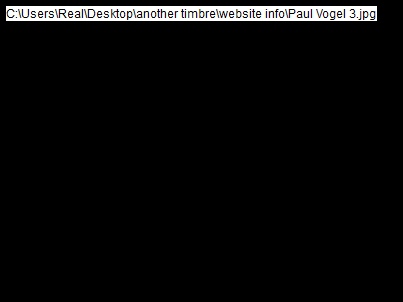
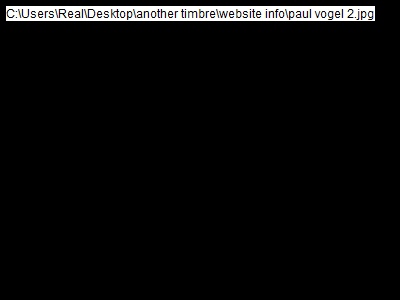
Reviews
“What a great idea to merge the Swedish-Irish group Chip Shop with the Barcelona-based ensemble Atolón. Chip Shop offers saxophone, clarinet, percussion, electronics, and computer, while Atolón provides trumpet, accordion, and turntables. The skill of these seasoned improvisers, combined with their wide range of instruments, has yielded Public Private, a meditation on impermanence that's pure sonic poetry.
In February 2012, the two groups spent three days together rehearsing and recording, which concluded with a concert in Barcelona. The live performance yielded the 43-minute "Public," the first track on the recording, and the days in the studio generated the 21-minute "Private." Interestingly, during the concert the two groups stayed on different sides of the stage instead of mixing into a big conglomeration. And "Private" was actually created after the fact: once their three days together ended, Ferran Fages from Atolón mixed together tracks that each group had recorded separately. As Fages states, "The idea was to think of the collaboration as a duo rather than merging everyone into one large ensemble. It wasn't easy to play without being affected by the other group's music, but that was the challenge."
"Public" is a generous piece of music, executed with care and imagination. Out of a black hole of silence, sounds emerge — sometimes understated and low-key, sometimes piercing and keening, sometimes crashing and menacing. These groups are working in a territory infused with the ghostly, a land of what's almost about to happen, what's just on the verge of. The accordion makes itself heard, but it's a specter of itself, an echo with faint edges of noise. A voice emerges, but the words aren't clear and they never return. Hollow-toned drones push aside the air, emerging from beneath only to vanish into mist. A glorious variety of sound materializes among these sonic ruins, including crisp electric sizzles, whirring purrs, corrugated squeals, and all manner of subterranean rumbles. The sounds combine to create a shape-shifting beast that's full of mystery, an impermanent universe full of fleeting beauty.
"Private" continues the dance with a similar sizzling vibe, but this work feels a bit more raw and prickly. Merging drones create a gorgeous hum, but they're interspersed with an edgy pitch that bites at their feet. Percussive shivers sound like brushes played on a red-hot surface, their edges curling with heat. The accordion returns, but here it has a jittery, menacing feel. Fascinating sounds flower throughout: there's something like an angry radiator, plus a throaty beast that resembles a tuba about to burst, not to mention strange, strangled noises similar to a computer gasping for breath. Altogether the piece is an alarmingly elegant dance, crackling on the edge of itself as it simultaneously disappears.
It's a brave thing for two groups with such distinctive sounds to come together to create something new. Chip Shop and Atolón show how it can be done, remaining true to themselves, while leaving enough space for fresh perspectives. This electroacoustic phantasmagoria is a sheer delight from beginning to end, and the fact that it's a collaboration makes it even more intriguing.”
Florence Wetzel, Squid’s Ear
“Voici typiquement le genre de disque que j’ai envie d’acheter, tout en sachant pertinemment qu’il risque très certainement de me décevoir. C’est idiot, mais quand on voit que deux groupes se réunissent, on s’attend à ce qu’ils fassent quelque chose de deux fois mieux que chacun individuellement, une attente irréaliste qui fait que je suis souvent déçu par ce genre de projet – il suffirait pourtant de me dire qu’ils vont juste faire quelque chose d’autre, et pas de deux fois mieux. Bref, Atolon et Chip Shop Music sont deux formations que j’aime beaucoup et dont j’attendais énormément de leur réunion. Malgré une déception inévitable au début, une grande richesse et une grande beauté ont fini par se révéler.
Pour présenter rapidement les deux formations, il s'agit d'un trio espagnol et d'un quartet anglo-suédois. On retrouve dans le premier Ferran Fages (platine acoustique), Ruth Barberan (trompette et objets) et Alfredo Costa Monteiro (accordéon & objets). Dans la seconde, sont présents Erik Carlsson (percussion), Martin Küchen (saxophone & radio), Paul Vogel (clarinette & ordinateur) et David Lacey (percussion & électronique). Deux témoignages de leur collaboration enregistrées par le producteur Simon Reynell sont présentées sur ce disque, une première de 43 minutes en live et une deuxième sans public d'une durée de 21 minutes. Hormis la durée, je ne trouve pas de grande différence entre les deux pièces. Tous les instruments et outils utilisés, aussi différents soient-ils, tendent à se confondre en une nappe légère, continue, abstraite et minimaliste. C'est effectivement très virtuose et maîtrisé, les idées sont assumées et exploitées sur la longueur. Mais le tout manque parfois de consistance. Sauf à de rares moments, justement quand un instrumentiste se démarque, quand une phrase sort du brouillard sonore.
Mais dans l'ensemble, l'univers sonore exploré durant cette heure est singulier et beau. Un univers constant et continu certes, mais qui ne manque pas de surprises et de rebondissements. Je suis partagé en somme entre la beauté de ce disque et son côté un peu trop attendu, car ces deux enregistrements collent un peu trop à ce que j'attendais d'eux. Seul le contenu réserve des surprises et est d'une grande richesse sonore et interactive, mais la forme manque quand même de consistance.”
Julien Heraud, Improv-Sphere
Discount price £5